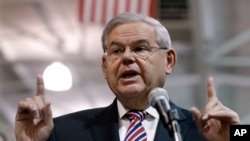U.S. lawmakers are questioning whether the country’s stepped-up engagement with Cuba will ultimately be beneficial or if it will be a setback.
In a Senate hearing Wednesday, on the eve of the next round of U.S.-Cuba talks, Senator Bob Menendez called the engagement “one-sided.”
“I don’t know what we have gotten in return. We have gotten nothing in return,” said Menendez.
“But Cubans have gotten plenty in return,” he added, saying if this was the United States’ way of negotiating, then the country has a “real problem” on its hands.
Among other things, Menendez cited reports of human rights abuses in Cuba. He said the abuses have “continued unabated with more than 1,600 cases of arbitrary political arrests” this year.
“President Obama may have outstretched his hand but the Castros have their fists real tight,” said Menendez.
Opening Embassies
In testimony before the Senate Foreign Relations Committee, State Department officials acknowledged there is still work to be done, even as the U.S. pursues normalized diplomatic relations with Cuba.
“Significant differences remain between our two governments,” said Roberta Jacobson, the Assistant Secretary of State for Western Hemisphere Affairs.
“While progress has been made in our efforts to re-establish diplomatic relations, we are not there yet,” she added.
On Thursday, Jacobson will head the U.S. delegation in a fourth round of talks with Cuba on restoring relations. Cuba's delegation will be led by Josefina Vidal of the Cuban foreign ministry.
The talks in Washington will focus in part on the steps needed to re-open embassies.
Earlier this week, Cuban Foreign Ministry deputy director Gustavo Machin said this could be the “last” round of talks before the opening of embassies.
Maintaining Leverage
In Wednesday’s congressional hearing, Senator Ben Cardin questioned whether a normalization of relations could result in a loss of U.S. leverage in addressing Cuba’s human rights abuses.
He cited concerns raised about Cuba in the State Department’s most recent report on human rights practices, including arbitrary arrests, denials of fair trials and restrictions on free speech, the press and the Internet.
“There is no doubt that we will continue to write human rights reports that are honest and unflinching in what they describe as going on in Cuba,” replied Jacobson.
She said that enhanced U.S.-Cuba relations would result in the U.S. having “another tool” at its disposal.
“Direct engagement, including the human rights dialogue, which will move forward,” said Jacobson.
The talks Thursday will be the first high-level engagement between the two countries since President Obama and Cuban President Raul Castro met during the April Summit of the Americas in Panama.
The talks also come just ahead of the May 29 deadline for Congress to weigh in on President Barack Obama’s decision to remove Cuba from the State Sponsor of Terrorism list.
Unsettled Legal Claims
Meanwhile, two U.S. lawmakers have introduced legislation that would require Cuba to address unsettled and unpaid legal claims with the United States.
Senators Marco Rubio and David Vitter said there is as much as $8 billion in “outstanding claims by American citizens and businesses,” involving property confiscated by the Castro regimes, that is currently unsettled.
In a statement, the lawmakers said the amount is “the largest uncompensated seizure of U.S. assets by a foreign government in U.S. history.”
State Department counselor Thomas Shannon told lawmakers on Wednesday that the broader purpose of U.S. diplomacy with Cuba is to enhance regional cooperation on a wide range of issues.
“I believe that we are actually going to be able to do more in the area of security. We are going to be able to do more in the area of non-proliferation. We are going to be able to do more in the area of fighting drugs because of this,” said Shannon.










